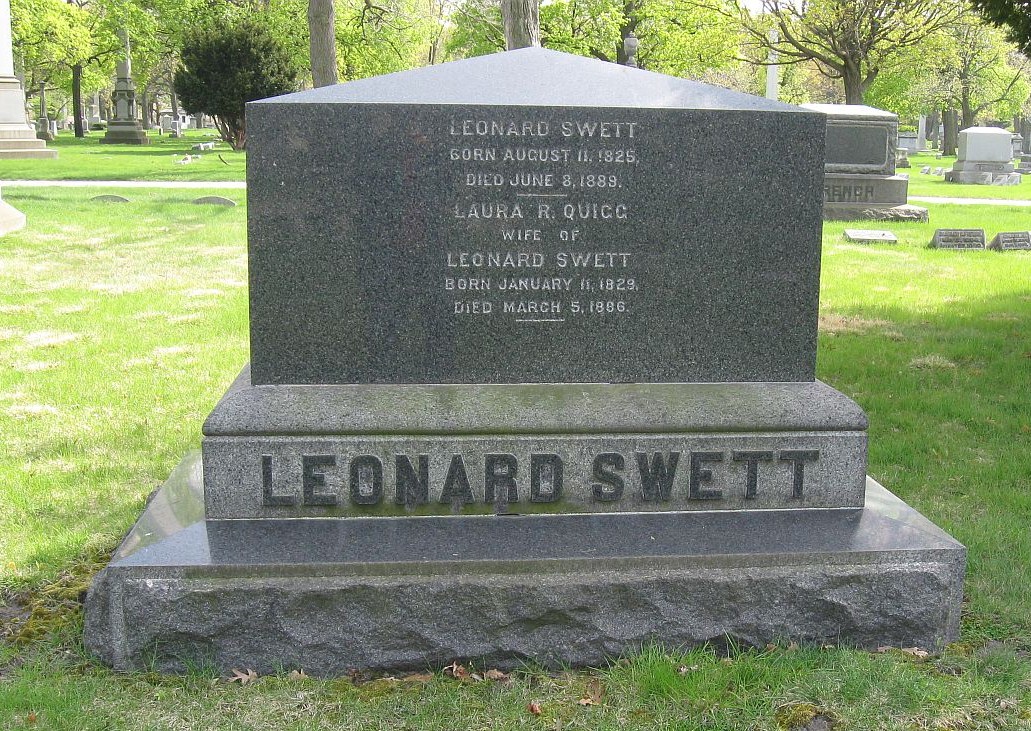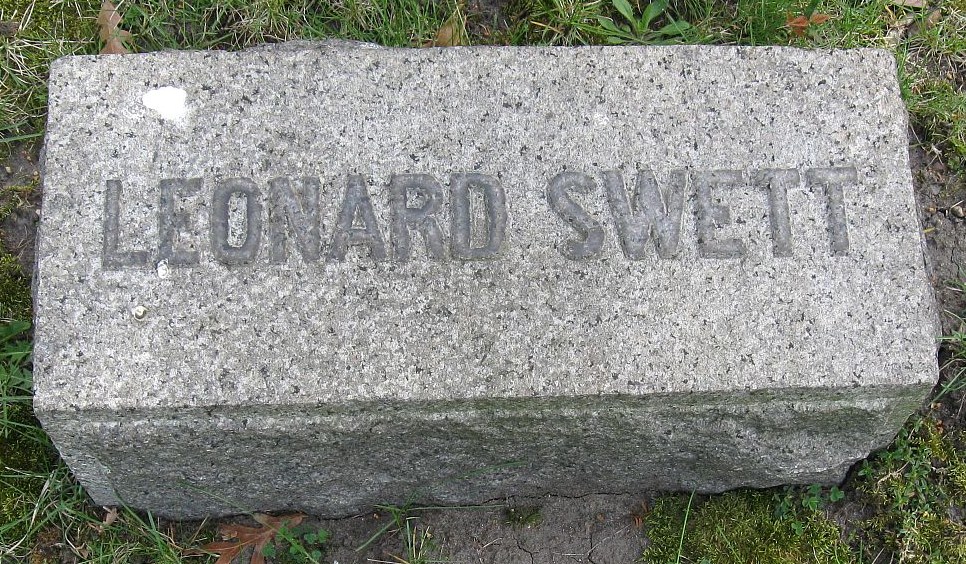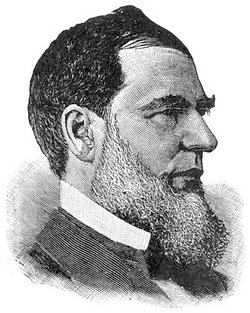Prior to the current occupant of the White House the most famous president who called Illinois home was Abraham Lincoln (Ronald Reagan notwithstanding). Although Lincoln himself is buried in Springfield, Illinois, many of his friends and intimates are buried in Chicago. While in Rosehill Cemetery recently working on a roster of Civil War dead, I came across the imposing black stone monument to one of Lincoln's closest friends and associates Leonard Swett. Forgotten today by all but a few Lincoln enthusiasts, Leonard Swett led a remarkable life - and there are those who say that Lincoln would never have made it to the White House if it had not been for the behind-the-scenes work of Swett. The Chicago Daily Tribune gave Leonard Swett an impressive obituary when he died in June of 1889:
LEONARD SWETT IS DEAD
Chicago Thus Loses a Citizen of National Reputation.
One of the Most Prominent Lawyers of the Northwest, He Was the Intimate Friend of Lincoln, Whom He in Many Respects Resembled - A Sketch of His Career as Lawyer - Famous Cases That He Won.
Leonard Swett is dead. Chicago loses one of her foremost lawyers and the country a man who has been prominently identified with its history and progress.
The particulars of Mr. Swett's death are short. He had been in unusually good health for two years. He had not lost a day at the office nor before the court until last April. At that time he went to Bloomington to deliver a lecture on Lincoln. His old neighbors gave him dinner after dinner and reception after reception. He came home ill. A severe cold aggravated a case of diabetes, with which he had before been troubled. After his return he was able to drive occasionally and to go to the office once in a while. There was no apprehension whatsoever concerning his life until yesterday morning at 2 o'clock. At that time he became unconscious. Drs. Lyman, Johnson, Davis and Westcott were called, but nothing could be done. He never regained consciousness. At noon yesterday, Mr. Swett passed away.
The funeral will be held Tuesday afternoon at 2 o'clock, from the Third Presbyterian Church. The Rev. Dr. Withrow and the Rev. Dr. Thomas will conduct the services.
For a third of a century Leonard Swett has been one of the most prominent lawyers of the Northwest. During all this time he has also been one of the most conspicuous citizens of Illinois and is thoroughly identified with the history of the State. While he has been most eminent in the law, and though he has held but a few public offices, his influence in the policies of State and Nation has been great.
Mr. Swett was born near the Village of Turner, Oxford County, Me., on what is still known as the "Albine Richer farm." His parents, John and Remember Swett, believed thoroughly in educating their children. At the age of 12, having previously been in the schools of the neighborhood, he began the study of Latin and Greek with the Rev. Thomas R. Curtis, his parents having, as they supposed "elected" him for the ministry. When 15 years of age he went to North Yarmouth Academy and then entered Waterville College, now known as Colby University. Having decided on the study of law he left college before he had finished his fourth year and entered the law office of Howard & Shepley of Portland. He remained with them two years and then went South and West, seeking for a favorable location. He reached Madison, Ind. and was there prompted to enlist as a private in the Fifth Indiana Infantry. He was made Orderly Sergeant of the company, and was practically in command of the company as Captain. He entered the City of Mexico. In May, 1848, he was taken sick at Vera Cruz and lay in the hospital there till peace was declared. He was then sent up the Mississippi River to the Jefferson Barracks, Missouri, where he was discharged. On this trip one-third of the passengers died. Although greatly shattered in health Mr. Swett survived his attack of sickness.
He came to Clinton, Ill. where he was admitted to the bar and began the practice of law. He afterward moved to Bloomington, Ill. From there he was sent for one term to the State Legislature and was also Attorney General for two years. These were the only public offices he ever held.
His Intimacy With Abraham Lincoln
At Bloomington he became a close friend of Judge David Davis. In his travels through the Eighth Judicial District in the years between 1850 and 1860 he met Lincoln, often practiced in the same courts with him, and they became the warmest of personal friends. The admiration of each man for the other was genuine and strong.
Judge Davis and Mr. Swett both appreciated Lincoln. They saw that he was the man the Nation needed, and it was largely their efforts which led to Lincoln's nomination. Mr. Swett was a prime mover in this and was a controlling influence in planning and executing that remarkable campaign which resulted in his nomination and election.
The political prominence which his successful championship of Lincoln brought led to his being the most prominent candidate for Governor of Illinois. He was defeated in the convention by the supporters of all the other candidates, who united on "Dick" Yates.
After Lincoln's election Mr. Swett went to Washington to urge the appointment of Judge Davis to the Supreme Bench. Judge Davis had but a local reputation. He was opposed by O.H. Browning, a man of National repute who had already made his mark in the United States Senate. Lincoln heard Mr. Swett's plan and said: "But what will I do with you?"
"I'll give you a receipt in full, " said Mr. Swett, "but if anything ever does come around to me give me something that will pay."
Lincoln acted on the suggestion and secured him the control of the great suit in which the California Quicksilver Mining Company and the great (New) Almaden mine were involved. Mr. Swett came back from California with a fee of $104,000.
Mr. Swett's fund of reminiscences of Lincoln was perhaps as great as that of any man now living. His friends will long remember his after-dinner stories of Lincoln and of pioneer times in Illinois. It is a pity that these were never collected and printed while Mr. Swett could revise them.
Mr. Swett did not enter practical politics again after the famous campaign of 1860 until 1872, when he went into the National Reform Convention at Cincinnati which nominated Greeley. He went there to nominate his old friend Judge Davis, and, failing in this, he came back and voted for Grant. He was among those at the head of the Grant forces in the famous third-term campaign and was in important factor in enrolling the solid Illinois delegation with the "306", though he was not a member of the convention.
He was again a figure in National politics in the last convention. The memory of his championship of Judge Gresham's cause is still fresh.
Swett As a Lawyer
As a young man it was said that Mr. Swett greatly resembled Abraham Lincoln in personal appearance. He was tall, angular, and dark, with prominent features strikingly like his great friend's. The coincidence in physical similitude extended in a considerable degree to the mental characteristics of the two men. He possessed the same class of humor and often employed the same quaint, epigrammatic methods of expressions peculiar to Mr. Lincoln.
As a lawyer Mr. Swett stood in the front rank in the Northwest. His special excellence lay in the direction of the trial of cases and possibly in the handling of criminal cases. As a speaker he had few or no superiors at the bar. He required scarcely any preparation and he was always ready with imagination, humor, and pathos in abundance. He possessed the subtle power to touch effectively men's emotional natures.
His first murder case was that of a young man at Shawneetown. The boy had shot down the clerk of the court because the clerk had posted some scurrilous matter about his father. Lincoln had first been engaged to defend the boy, but he had said that Swett was the man to defend that case, and he had come. Among the young lawyers who crowded the courtroom to hear the defense were John A. Logan and Robert Ingersoll. Mr. Swett put in the defense of temporary insanity. It was the first time that defense had been urged in this country, and it was successful.
Some Famous Cases
Mr. Swett afterwards tried many murder cases. He never lost but one before a jury. None of his clients except the (Haymarket) Anarchists ever suffered the extent of the law, and he only appeared in this case in the appeal to the Supreme Court.
Among other famous cases was his defense of Alexander Sullivan in his trial for murder. He was successful in a great insurance case at Hartford, which involved a new application of the laws of conspiracy. His argument in that case is still studied by attorneys. He was engaged to defend some of the great whiskey cases from the charge of conspiracy against the United States. He was asked when the case would come to trial. "Come to trial?" he said, "This is not the kind of a case to come to trial." And it never came to trial, though the similar cases which were tried landed the defendants at Joliet.
Mr. Swett was also retained in the Mackin case, but did not take an active part in the trial owing to sickness.
Mr. Swett was married July 20, 1854 to Laura R. Quigg, sister of his former law partner, Col. David Quigg. They had one child, Leonard H. Swett. Mrs. Swett died in February, 1886. July 15, 1887, Mr. Swett married Miss Louise Decker, who had long acted as his private secretary.
When he came to Chicago in 1854, he engaged in practice first with Andrew Harvie, then with Joseph E. Gary and J.N. Barker. In 1869 he became Corporation Counsel, and after several years in that position organized the firm of Tuley, Stiles & Lewis. IN 1879, Mr. Swett and Pliny N. Haskell were associated together, and this continued until Mr. Haskell's death, in 1884. The present firm was Swett, Grosscup & Wean, being composed of and besides Mr. Swett, P.S. Grosscup and Frank L. Wean.
Col. Munn's Reminiscences
Col. D.W. Munn was surprised last evening when a reporter called at his house, No. 458 West Adams Street and told him that Leonard Swett was dead. Col. Munn had thought that Mr. and Mrs. Swett were in Germany, and had gone there in search of improved health for Mr. Swett. Col. Munn said that he first met Leonard Swett as the Illinois Republican State Convention held in Decatur in 1860. At that time Mr. Swett was a prominent lawyer of Bloomington, and was a candidate before the Decatur convention for the nomination of governor.
"His opponents in the convention", said Col. Munn, "Were 'Dick' Yates, Norman B. Judd and 'Tom' Marshall. Subsequently Mr. Swett was active in the support of the nomination and election of Lincoln for President. After that he dropped out of politics until David Davis, a fellow-townsman, became a candidate for United States Senator, when Swett supported his enthusiastically. I don't remember exactly when Mr. Swett came to Chicago, but after his arrival here he soon became one of the most famous lawyers in the city. Two of these died before Mr. Swett; they were W.W. O'Brien and Emery A. Storrs. Swett was a man of ability and integrity. In many respects he resembled his intimate friend, Abraham Lincoln and especially so in that he was a good jury lawyer and had the faculty of impressing a jury with the fact that he was an honest man-as he undoubtedly was."
Chicago Daily Tribune - June 9, 1889
As we knew, Leonard Swett moved in impressive circles. What the Tribune article doesn't say, is that Swett and Louise Decker were personally married by Patrick A. Feehan, the Archbishop of Chicago:
As I mentioned above, Leonard Swett's impressive monument can be found over his grave in Section 104 of Rosehill Cemetery, Chicago, Illinois.


Patriot, statesman and close friend of Abraham Lincoln, may Leonard Swett rest in peace.



No comments:
Post a Comment